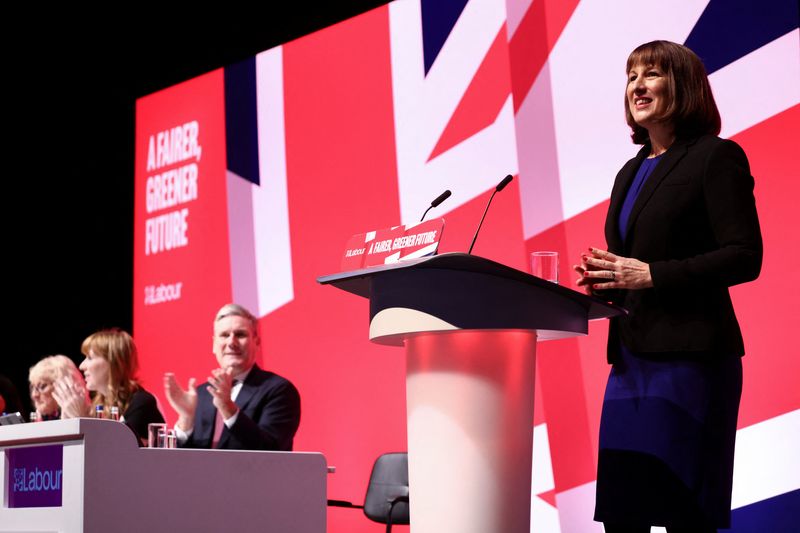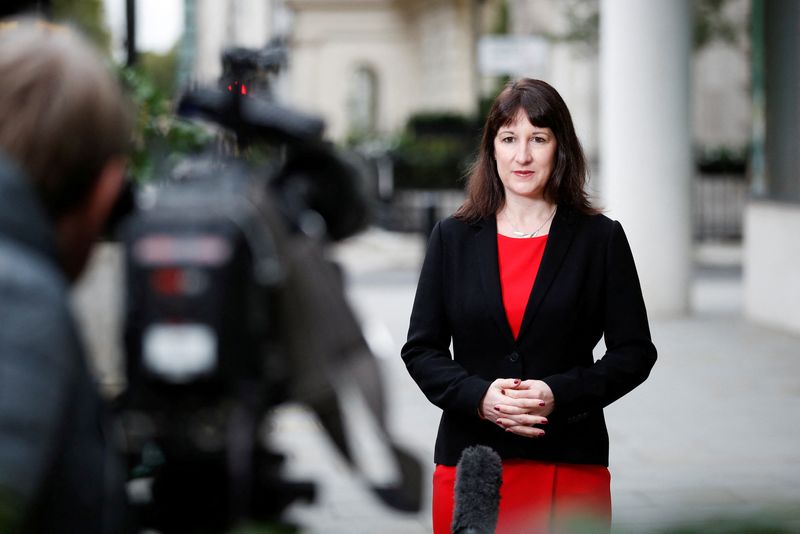By Elizabeth Piper and Andrew MacAskill
LIVERPOOL, England (Reuters) -Britain's opposition Labour Party set out its economic vision on Monday, promising, if in power, to be fiscally responsible and take care of public services, in a swipe at the Conservative government's tax cuts for the wealthy.
At their annual conference, Labour lawmakers are sensing a change in their fortunes after a punishing loss at a 2019 election, feeling they can now offer a real choice to voters after the government announced a "growth plan" that handed tax cuts mostly to big business and the wealthiest.
Friday's so-called mini-budget has opened up a divide between Prime Minister Liz Truss's Conservatives and the Labour Party of Keir Starmer, who wants to use the years before an expected election in 2024 to prove his team is ready for power.
Rachel Reeves, Labour's finance policy chief, told the conference in the northern English city of Liverpool the party wanted to spur growth by focusing on green projects, but would do so without sacrificing workers by raising the minimum wage.
"Know that these are Labour’s priorities. Strong public services, to support people, and grow our economy," Reeves told the conference to sustained applause.
"It's time for a government that is on your side. That government is a Labour government, and be in no doubt, that government is on its way."
She again took aim at the "Growth Plan" presented by finance minister Kwasi Kwarteng on Friday, accusing him of prioritising the wealthy over working people struggling with rising prices by turning to the discredited theory of "trickle-down economics".
"A return to a trickle-down idea that has been tried, has been tested, and has failed," she said, again comparing Truss and Kwarteng as "two desperate gamblers in a casino, chasing a losing run".
The government says deregulation and tax cuts will lift Britain's rate of economic growth over the longer term.
Reeves also pledged to "build British industry" by using a national wealth fund similar to funds in Norway and Singapore, with an initial 8 billion pounds ($8.6 billion) earmarked for green projects, and to set a new minimum wage.
Labour is hoping to fill the gap left by the Conservative government, which has shifted to the right with its economic plan and also lost the confidence of the markets, with the pound plunging to a record low against the dollar.
Kwarteng scrapped the country's top rate of income tax and cancelled a planned rise in corporate taxes, all on top of a hugely expensive plan to subsidise energy bills for households and businesses, with little detail of how it would be paid for in the short term beyond increasing government debt.
On Sunday, Starmer pledged to reverse the abolition of the top rate of income tax and restore it to 45%, saying tax cuts for the wealthy would not spur growth.
Reeves said the plan was not what people voted for after Truss was appointed as prime minister by the Conservative Party rather than the public following her predecessor Boris Johnson's resignation.

"It's putting our economy in danger," she said. "And Labour will fight it every step of the way."
($1 = 0.9263 pounds)
